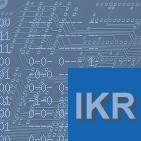 |
|
 |
Institute of Communication Networks and Computer Engineering (IKR)
|
 |
IKR Publication No 36529 |

|
|
 |
 |
 |
|
 |
 |
 |
Publication No 36529
|
|
Author(s)
|
Sommer, J.*; Burgstahler, L.; Feil, V.
|
|
Title
|
An Analysis of Automotive Multi-Domain CAN Systems
|
|
Methods
|
Performance Evaluation; Systems Engineering
|
|
Keywords
|
AUTOMOTIVE; CAN; SIMULATION; MODELING
|
|
Abstract
|
In today's passenger-cars, a large number of electronic control units (ECUs) and functions are distributed over a multitude of bus systems (domains), connected via gateways. What was once thought of as a means to reduce complexity and facilitate management has become a new challenge with the increasing number of cross-domain functionalities, i.e. applications that exchange data over domain boundaries. Gateways often become bottlenecks between buses (e.g. by increasing latency) and in the case of Controller Area Network (CAN) buses, they can pose further problems with respect to the priority-based network access method. Therefore, the introduction of cross-domain functions increases the necessity for a thorough performance evaluation of the vehicles' network architectures during the concept and development phases. In this paper we analyse the impact of cross-domain functionalities on automotive CAN system's performance, especially with respect to delay. The focus of our work is on modelling, simulation, and analysis of the system. Therefore, we describe our models of ECUs, CAN buses, and gateways and how we used them to simulate a complete multi-domain CAN system. Based on this, the results of performance analysis within the gateway and the domains are presented.
|
|
Year
|
2006
|
|
Reference entry
|
Sommer, J.; Burgstahler, L.; Feil, V.
An Analysis of Automotive Multi-Domain CAN Systems
Proceedings of the 12th Open European Summer School and IFIP WG 6.3, WG 6.4, WG 6.6 and WG 6.9 Workshop (EUNICE 2006), Stuttgart, September 2006
|
|
BibTex file
|
Download [BIBTEX]
|
|
Full Text
|
Download
[PDF]
|
|
|
Authors marked with an asterisk (*) were IKR staff members at the time the publication has been written.
|
|
|
|
|